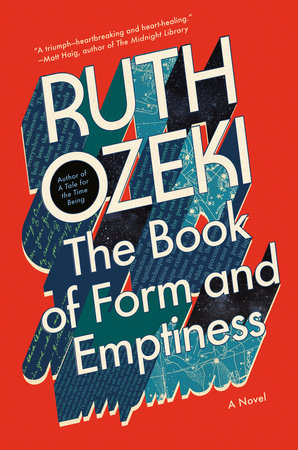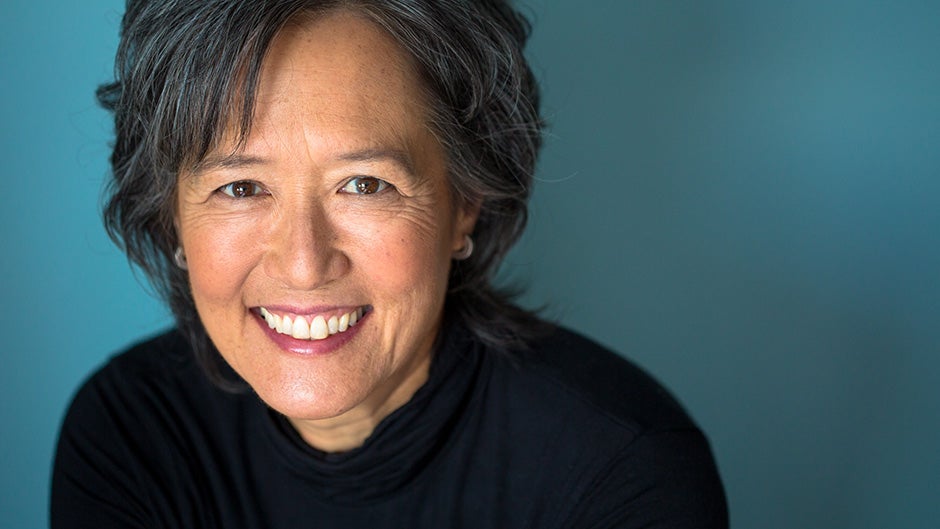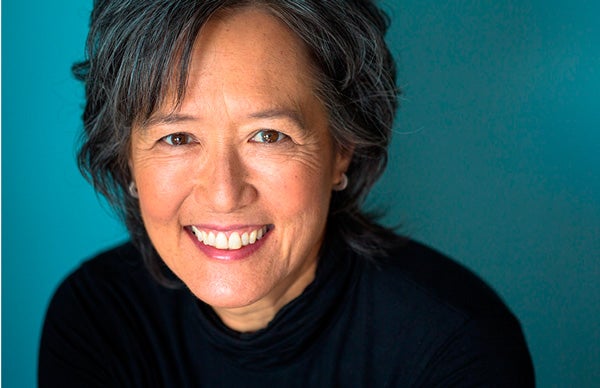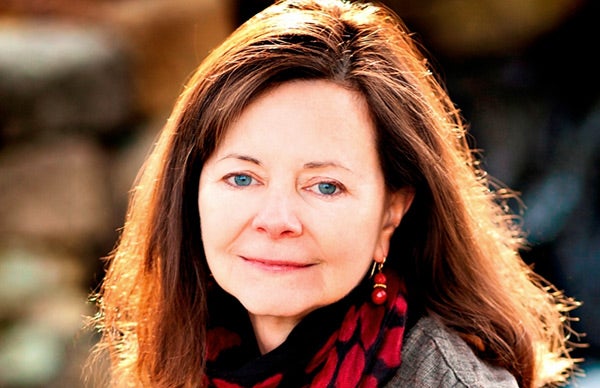Ruth Ozeki
Filmmaker, novelist, and Zen Buddhist priest
Photo credit: Kris Krug
-
About Ruth Ozeki
Ruth Ozeki is a filmmaker, novelist, and Zen Buddhist priest, whose award-winning novels have been described as “witty, intelligent and passionate” by The Independent, and as possessing “shrewd and playful humor, luscious sexiness and kinetic pizzazz” by the Chicago Tribune.
Her first novel, My Year of Meats, garnered widespread glowing reviews, awards, and a still-growing readership. It was also an international success and has translated into eleven languages and published in fourteen countries. A sexy, poignant, funny tale about global meat and media production, My Year of Meats tells the story of Jane and Akiko, two women on opposite sides of the planet, whose lives are connected by a TV cooking show. It won the Kiriyama Pacific Rim Award, the Imus/Barnes and Noble American Book Award, and a Special Jury Prize of the World Cookbook Awards in Versailles.
Ozeki’s second novel, All Over Creation shifts the focus from meat to potatoes in a story of a family farmer, his prodigal daughter, an itinerant gang of environmental activists, and a New Age corporate spin doctor, whose lives and interests collide in Liberty Falls, Idaho. Again a New York Times Notable Book, All Over Creation is the recipient of a 2004 American Book Award from the Before Columbus Foundation, as well as the Willa Literary Award for Contemporary Fiction.
Ruth Ozeki’s next novel, A Tale for the Time Being, an instant New York Times bestseller list, is a brilliantly inventive, beguiling story about the relationship between writer and reader, past and present, fact and fiction, quantum physics, history, and myth. It was shortlisted for the 2013 Man Booker Prize. Her latest novel, The Book of Form and Emptiness, the 2022 winner of the Women’s Prize for Fiction, is a brilliantly inventive new story about a boy who hears the voices of objects all around him and a mother drowning in her possessions.
Ruth Ozeki was born and raised in New Haven, Connecticut, by an American father and a Japanese mother. She studied English and Asian Studies at Smith College and traveled extensively in Asia. She received a Japanese Ministry of Education Fellowship to do graduate work in classical Japanese literature at Nara University. During her years in Japan, she worked in Kyoto’s entertainment or “water” district as a bar hostess, studied flower arrangement as well as Noh drama and mask carving, founded a language school, and taught in the English Department at Kyoto Sangyo University.
Ruth Ozeki returned to New York in 1985 and began a film career as an art director, designing sets and props for low budget horror movies. She switched to television production, and after several years directing documentary-style programs for a Japanese company, she started making her own films. Body of Correspondence (1994) won the New Visions Award at the San Francisco Film Festival and was aired on PBS. Halving the Bones (1995), an award-winning autobiographical film, tells the story of Ozeki’s journey as she brings her grandmother’s remains home from Japan. It has been screened at the Sundance Film Festival, the Museum of Modern Art, the Montreal World Film Festival, and the Margaret Mead Film Festival, among others. Ozeki’s films, now in educational distribution, are shown at universities, museums and arts venues around the world.
Ruth Ozeki, a frequent speaker on college and university campuses, currently divides her time between New York City and British Columbia, where she lives with her husband, artist, Oliver Kellhammer. She currently teaches creative writing at Smith College, where she is the Grace Jarcho Ross 1933 Professor of Humanities in the Department of English Language and Literature. She serves on the advisory editorial board of the Asian American Literary Review and on the Creative Advisory Council of Hedgebrook. She practices Zen Buddhism with Zoketsu Norman Fischer, and is the editor of the Everyday Zen website. She was ordained as a Soto Zen priest in June, 2010.
Contact us to learn more about booking Ruth Ozeki for your next event.
-
Speaking Topics
An Evening with Ruth Ozeki
A Tale for the Time Being
All Over Creation
My Year of Meats
-
Video
-
Praise for Ruth Ozeki
We loved having Ruth and our audience enjoyed her lecture. I have only heard good things.
— The Cabin Literary CenterRuth is absolutely wonderful both as a speaker and to work with, it was a genuine pleasure to spend time with her. She really connected with the high school students at the community events as well. We’ve received very positive feedback from the audience so far.
— Literary ArtsPraise for The Book of Form and Emptiness
[A] Borgesian, Zen Buddhist parable of consumerism . . . [Ozeki] endows objects and animals with anima, the breath of life . . . [she] ensouls the world . . . There’s powerful magic here . . . Ozeki is unusually patient with her characters, even the rebarbative ones, and she is able to record the subtle peculiarities of other classes of beings that more overeager writers would probably miss . . . Ozeki gives us a metaphor for our very own American consumption disorder, our love-hate relationship with the stuff we produce and can’t let go of.
— New York Times Book ReviewA masterful meditation on consumer culture . . . This novel’s meditative pacing perfectly suits its open-hearted contemplation. The book’s self-awareness allows it to comically hedge and tiptoe, to digress into diatribes into the ‘false dichotomies and hegemonic hierarchies of materialist colonizers’ only to catch itself and sheepishly apologize: ‘Sorry. That turned into a rant. No reader likes a rant. As a book, we should know better.’ The Book of Form and Emptiness is concerned foremost with the outsiders in our world, the ones who hear voices, who are friendless, who fall into addiction and self-harm. It’s concerned, too, with the ultimate outsiders, the objects that we produce and discard, produce and discard. It is both profound and fun, a loving indictment of our consumer culture. As the novel asks the reader turning the pages, ‘has it ever occurred to you that books have feelings, too?’
— USA Today[A] tale of sorrow, danger and tentative redemption serves as the springboard for extended meditations on the interdependence of all beings, the magic of books, the disastrous ecological and spiritual effects of unchecked consumerism and more . . . one of Ozeki’s gifts as a novelist is the ability to enfold provocative intellectual material within a human story grounded in sharply observed social detail . . . The Book itself has a marvelous voice: adult, ironic, affirming at every turn the importance of books as a repository of humanity’s deepest wisdom and highest aspirations.
— Washington PostThere has never been a more timely novel. . . a beautiful, funny, sad, haunting, and extremely moving narrative . . . Ozeki’s commitment to having all her novels be co-productions created by multiple figures reaches its most dazzling manifestation in a book and a protagonist, mutually engendered.
— Los Angeles Review of BooksObjects and ideas come to life in [The Book of Form and Emptiness] . . . a vivid story of fraught adolescence, big ideas and humanity’s tenuous hold on a suffering planet . . . Ozeki, an imaginative writer with a subversive sense of humor, has an acute grasp of young people’s contemporary dilemmas . . . This would be a great book to read in tandem with an adolescent in your life, a potential classic for the young-adult audience . . . [Ozeki offers] a profound understanding of the human condition and a gift for turning it into literature.
— Los Angeles TimesOzeki has shifted her readers’ way of perceiving what is ‘normal’ through a sort of slow, capillary action. Her books are not didactic, but they are useful; they’re not mission-driven, but they are richly moral. She writes urgently about the environment—you leave an Ozeki book knowing more about ocean contamination or factory farming—and her novels tend to include a painful parent-child rupture as well as a burbling stream of absurdist humor . . . Ozeki started writing The Book of Form and Emptiness eight years ago, but it is eerily suited to what readers are going through now, a quantum companion to A Tale for the Time Being: If time is part of healing, sorting through matter—through stuff—is part of mourning.
— New York MagazineHeartfelt . . . Ozeki, a practicing Buddhist priest, infuses her story with Zen philosophy, using themes of mindfulness and our connection to the living world to highlight pressing modern concerns like climate change, capitalism and the function of art. Inventive, vivid and propelled by a sense of wonder, The Book of Form and Emptiness will delight younger and older readers alike.
— TIME[It’s hard] not to like Ozeki’s calm, dry, methodical good humour and wit, her love affairs with linguistics and jazz and the absurd, her cautious optimism, her gentle parodies . . . [she] is carefully celebrating difference, not patronizing dysfunction. Out of their fractured relations, she makes something so satisfying that it gave me the sense of being addressed not by an author but by a world, one that doesn’t quite exist yet, except in tenuous parallel to ours: a world built out of ideas that spill into the text like a continuous real-time event.
— The GuardianAn ambitious and ingenious novel that presents a stinging exploration of grief [and] a reflection on our relationship to objects . . . combine[s] daunting intellectual complexity and accessible big-heartedness . . . The most endearing aspect of Ozeki’s novel is its unabashed celebration of words, writing, and reading . . . Ozeki’s playfulness and zaniness, her compassion and boundless curiosity, prevent the novel from ever feeling stiff or pretentious. Clever without being arch, metafictional without being arcane, dark without being nihilistic, The Book of Form and Emptiness is an exuberant delight.
— Boston GlobeThis book ponders the very nature of things . . . Do inanimate items possess a life force? How do we distinguish acute sensitivity from mental illness? These questions fuel a searching novel, one that combines a coming-of-age tale with an ode to the printed page. . . Ozeki’s incisive on matters like consumerism and climate change. Meanwhile, her ruminations on life’s greatest mysteries provide an elegant foundation for an intriguing story.
— Star-TribuneIn giving the Book a point of view, Ozeki creates a loquacious, animated voice with ideas about other books, the past, the need for human stories and the mutual needs of humans and books. . . With this well-developed voice, Ozeki plays humorously with ideas about what a novel is — about the development of a story, how it gets told, who tells it, who hears it and how books affect people . . . Ozeki, who is a Zen Buddhist priest and filmmaker, takes up big ideas about this moment on our planet, but also offers close descriptions of memorable images that make the prose absorbing . . . These images reverberate long after the reading, speaking to Ozeki’s broad and benign vision of connected beings.
— Seattle TimesThe Book of Form and Emptiness indeed has everything one wants from a novel—sympathetic and interesting characters, a propulsive story that is heartbreaking but also playful and affirming, artful structure and skillful point of view—all while wrestling with life’s big questions. The novel’s engagement with issues of climate change and consumerism culture give it an urgency, but its whimsical and epic story makes it the kind of book to settle into, where you both want to keep reading and never want it to end. It’s a novel that reminds you of the power of books, exploring the magical exchange between writer and reader.
— Fiction Writers ReviewThe Book of Form and Emptiness indeed has everything one wants from a novel—sympathetic and interesting characters, a propulsive story that is heartbreaking but also playful and affirming, artful structure and skillful point of view—all while wrestling with life’s big questions. The novel’s engagement with issues of climate change and consumerism culture give it an urgency, but its whimsical and epic story makes it the kind of book to settle into, where you both want to keep reading and never want it to end. It’s a novel that reminds you of the power of books, exploring the magical exchange between writer and reader.
— Fiction Writers ReviewOn the surface, Ozeki’s novel is about a grief-stricken family struggling to find meaning in the aftermath of a tragedy. But dig deeper and the story is an intricately layered commentary on modern society and the significance it puts on material objects, a study on subjectivity and the nature of reality. All the while, it’s a book about the unknown, all-knowing realms of the imagination…When spending time in Ozeki’s world, the empirically provable and quantifiable become less important, and the truths of our inner lives grow louder, if only we can honor those voices.
— Japan TimesWith her characteristic charm, empathy, and perspicacity, Ozeki writes Benny’s story of learning to hear, and manage, the voices, and hear himself along the way.
— The Millions[A] beautiful, heartbreaking, and hopeful novel
— Reader’s Digest[A] poignant and funny story.
— St. Louis Post-DispatchIf what you need right now is to sink into a big, warm, literary bath, this is the book for you. It’s not that Ozeki’s latest novel isn’t challenging, it’s just that it manages to be so while also being pure pleasure, especially if you’re the kind of person who once had mostly books for friends . . . It’s a big book in more ways than one, complex and ambitious and wide-ranging, but honestly also just so charming I found it hard to walk away from, even when I was done.
— Emily Temple, Lit HubSpectacular . . . this novel is filled with hope, compassion and more than a little wonder . . . Ozeki’s books consistently nourish the soul.
— Shelf Awareness (starred)With all confidence, I can say that The Book of Form and Emptiness is very real. It’s a wonderful, heartwarming story of emotional growth filled with characters as real as anyone you would meet on the street. Except we are meeting them through the Book. And the Book, as we learn, knows all.
— Washington Independent Review of BooksOzeki’s illuminating postmodern latest […] explores themes of mourning, madness, and the powers of the imagination . . . Ozeki playfully and successfully breaks the fourth wall […] and she cultivates a striking blend of young adult fiction tropes with complex references to Walter Benjamin, Zen Buddhism, and Marxist philosophy. This is the rare work that will entertain teenagers, literary fiction readers, and academics alike.
— Publishers Weekly[Ozeki] writes with bountiful insight, exuberant imagination, and levitating grace about psychic diversity, our complicated attitude toward our possessions, street protests, climate change, and such wonders as crows, the moon, and snow globes. Most inventively, Ozeki celebrates the profound relationship between reader and writer. This enthralling, poignant, funny, and mysterious saga, thrumming with grief and tenderness, beauty and compassion, offers much wisdom.
— Booklist (starred)A great premise, one that perfectly captures how it feels to be a child falling into a lifelong love of reading. It’s a book for book people, exploring how books can offer meaning and – in this case, literally – speak to us.
— BookPageA meditative tribute to books, libraries, and Zen wisdom.
— Kirkus“This compassionate novel of life, love and loss glows in the dark. Its strange, beautiful pages turn themselves. If you’ve lost your way with fiction over the last year or two, let The Book of Form and Emptiness light your way home.
— David Mitchell, Booker Prize-finalist author of Cloud Atlas and Utopia AvenueHeart-breaking and heart-healing—a book to not only keep us absorbed but also to help us think and love and live and listen. No one writes quite like Ruth Ozeki and The Book of Form and Emptiness is a triumph.
— Matt Haig, New York Times bestselling author of The Midnight LibraryThis is both an extremely vivid picture of a small family enduring unimaginable loss, and a very powerful meditation on the way books can contain the chaos of the world and give it meaning and order. Annabelle and Benny Oh try to stay afloat in a sea of things, news, substances, technological soullessness, and psychiatric quagmires, and the way they learn to live and breathe and even swim through it all feels like the struggle we all face. The Book of Form and Emptiness builds on the themes of A Tale for the Time Being, and ratifies Ozeki as one of our era’s most compassionate and original minds.
— Dave Eggers, author of The Circle and The ParadeOzeki has done it again. This time she crosses into new dimensions, breathing life into pages, enticing us into an intimate world. Richly imagined, gorgeously executed, The Book of Form and Emptiness is a remarkable book.
— David Eagleman, acclaimed neuroscientist and author of LivewiredPraise for A Tale for the Time Being
As contemporary as a Japanese teenager’s slang but as ageless as a Zen koan, Ruth Ozeki’s new novel combines great storytelling with a probing investigation into the purpose of existence. . . . She plunges us into a tantalizing narration that brandishes mysteries to be solved and ideas to be explored. . . . Ozeki’s profound affection for her characters makes A Tale for the Time Being as emotionally engaging as it is intellectually provocative.
— The Washington PostSixteen-year-old schoolgirl Nao Yasutani’s voice is the heart and soul of this very satisfying book. . . . The contemporary Japanese style and use of magical realism are reminiscent of author Haruki Murakami.
— USA TodayMasterfully woven . . . Entwining Japanese language with WWII history, pop culture with Proust, Zen with quantum mechanics, Ozeki alternates between the voices of two women to produce a spellbinding tale.
— O, The Oprah MagazineForget the proverbial message in a bottle: This Tale fractures clichés as it affirms the lifesaving power of words. . . . As Ozeki explores the ties between reader and writer, she offers a lesson in redemption that reinforces the pricelessness of the here and now.
— ElleA powerful yarn of fate and parallel lives.
— Good HousekeepingMagnificent . . . brings together a Japanese girl’s diary and a transplanted American novelist to meditate on everything from bullying to the nature of conscience and the meaning of life. . . . The novel’s seamless web of language, metaphor, and meaning can’t be disentangled from its powerful emotional impact: These are characters we care for deeply, imparting vital life lessons through the magic of storytelling. A masterpiece, pure and simple.
— Kirkus Reviews (starred review)An intriguing, even beautiful narrative remarkable for its unusual but attentively structured plot. . . . We go from one story line to the other, back and forth across the Pacific, but the reader never loses place or interest.
— Booklist (starred review)Ozeki’s absorbing novel is an extended meditation on writing, time, and people in time. . . . The characters’ lives are finely drawn, from Ruth’s rustic lifestyle to the Yasutani family’s straitened existence after moving from Sunnyvale, California, to Tokyo. Nao’s winsome voice contrasts with Ruth’s intellectual ponderings to make up a lyrical disquisition on writing’s power to transcend time and place. This tale from Ozeki, a Zen Buddhist priest, is sure to please anyone who values a good story broadened with intellectual vigor.
— Publishers WeeklyA beautifully interwoven novel about magic and loss and the incomprehensible threads that connect our lives. I loved it.
— Elizabeth Gilbert, bestselling author of Eat, Pray, LoveA Tale for the Time Being is a timeless story. Ruth Ozeki beautifully renders not only the devastation of the collision between man and the natural world, but also its often miraculous results.
— Alice Sebold, bestselling author of The Lovely BonesIngenious and touching. . . . I read it with great pleasure.
— Philip Pullman, award-winning author of The Golden CompassOne of the most deeply moving and thought-provoking novels I have read in a long time. In precise and luminous prose, Ozeki captures both the sweep and detail of our shared humanity. The result is gripping, fearless, inspiring and true.
— Madeline Miller, author of CirceA Tale for the Time Being is equal parts mystery and meditation. The mystery is a compulsive, gritty page-turner. The meditation—on time and memory, on the oceanic movement of history, on impermanence and uncertainty, but also resilience and bravery—is deep and gorgeous and wise. A completely satisfying, continually surprising, wholly remarkable achievement.
— Karen Joy Fowler, bestselling author of The Jane Austen Book ClubBooks by Ruth Ozeki
Media About Ruth Ozeki
Request Fees
and Availability
- 212 572-2013
- Ruth Ozeki travels from New York, NY or Vancouver, B.C.
Featured Title

The Book of Form and Emptiness
Longlisted for the Women’s Prize for Fiction
“Once again, Ozeki has created a masterpiece. Her generous heart, remarkable imagination, and brilliant mind light up every page.” —Karen Joy Fowler, author of We Are All Completely Beside Ourselves












